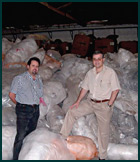
Eight years ago, the partners in a Guatemalan plastic packaging company began a small recycling operation they named Ecoplast. The recycling company has grown from a single, jury-rigged machine at the back of the packaging company to a 24-hour-per-day, 7-days-a-week operation using imported Italian machinery capable of handling more than 400 kg/hour of plastics, with more than thirtyfive full-time employees and as many as twenty temporary workers at busy times. Most impressively, the company has expanded to additional waste streams-and is looking for more.
Having begun with relatively clean, post-industrial scrap from local plastics factories, Ecoplast now recycles dirty post-consumer waste (that is, household trash) taken from Guatemala City’s sprawling garbage dump. Ecoplast sells the recycled plastic pellets it produces to customers in China, Mexico, and the United States, as well as to local plastics producers.
Guatemala is a relatively poor country (per capita gross national income was only $1,910 in 2003 compared to $37,610 in the U.S.), so its citizens use less plastic than those in wealthier countries. Even so, the Guatemalan recycling industry has succeeded at doing what wealthier countries struggle with-recycling post-consumer waste. Why has private-sector recycling been so successful in Guatemala?
For one thing, Guatemala does not domestically produce the plastic pellets used to make packaging and other products. The transportation costs of bringing such pellets from the United States (the primary source of raw materials for the Guatemalan plastics industry) created a business opportunity for plastics recycling.
Another factor is the relatively low cost of labor in Guatemala. Recycling post-consumer waste is labor-intensive. It requires separating the various types of plastic from one another and from the remainder of the garbage, and then cleaning it for recycling. (The high cost of labor in the United States is one reason why U.S. municipal recycling programs require consumers to presort their garbage.) In Guatemala, sorting and cleaning garbage are accomplished without making the recycled product more expensive than virgin materials.
Turning an opportunity into a successful business takes more than a potential cost advantage, of course. Guatemalan entrepreneurs have found new ways to separate recyclables from other garbage. Recycling begins in the trucks (operated by private concessionaires, not the government) that pick up Guatemala City’s garbage. As the trucks circulate through the city, employees work inside the trucks sorting out recyclable materials, including the bags households use to dispose of their trash. By the time the truck arrives at the dump, a first pass at removing recyclables has already taken place. (By combining trash collecting and sorting in one truck, the Guatemala method reduces truck air pollution emissions and lowers costs. In New York City, in contrast, one set of trucks picks up trash and another picks up recyclables- leading to high costs, including environmental ones.)
Once the garbage is unloaded at the Guatemala City dump, an army of independent garbage sorters sifts through it a second time in search of recyclables. A series of specialized markets exists at the dump, including various types of plastics, glass, and metal. Ecoplast recently opened a facility next to the dump. This cut its transportation costs (and truck emissions) significantly, since on-site shredding reduces the volume that must be trucked to the main plant.
The life of a garbage sorter is not an easy one. Guatemala’s city dump has been featured in documentaries that focus on the difficult lives of the poor people who work there. Many have scarred arms and legs from the cuts they receive sifting through the refuse. The smell and clouds of insects that hover around the dump make working conditions unpleasant. Yet garbage sorting provides a source of income for hundreds of people.
Without the efforts of the garbage sorters, the critical separation of valuable materials from trash would not take place. Recycling post-consumer material is dependent upon dividing garbage into its separate components. This separation can either occur through compensated, voluntary work at the end of the waste stream, as in Guatemala, or through mandatory uncompensated labor in the home, as with most U.S. municipal recycling programs.
As more businesses have entered plastics recycling, they have expanded their search for recyclable plastic beyond the city dump and other original sources. Ecoplast, for example, has persuaded several food companies to sell it their plastic packaging waste rather than burn the waste in open air fires. The food companies earn income from a waste product, Ecoplast secures more plastic, and air quality improves as open-air burning of heaps of plastic ends.
By providing remote collection points with equipment to crush bottles, recyclers can cut the costs of transporting post-consumer waste. Ecoplast, for example, plans to collect post-consumer plastic at schools throughout Guatemala.
Another Guatemalan company found a unique opportunity to gather post-consumer materials. A hydroelectric plant on the Las Vacas River had to deal with floating trash in the river that snarled its equipment. To keep the trash out, the company built a screen across the river upstream from the intake point. The firm then built a plant to recycle the plastics that accumulated. It now creates plastic fence posts from the post-consumer trash it removes from the water.
Recyclers face challenges unimaginable in developed economies. Recycling requires substantial amounts of electricity, transportation services, and clean, cold water (inputs that are often obscured by recycling’s “green” image). None of these is cheap or readily available in Guatemala. Ecoplast, for example, spends more than $8,000 per month on electricity, more than twice what it would pay to operate the same plant in even the most expensive parts of the United States.
A “garbage mafia” operates at the Guatemala City dump. A series of bosses hold “concessions” for various types of material at the dump from the main organized crime groups. Only individuals authorized by the relevant boss may sort trash, and all the recyclables they find must be sold to the boss. The lack of competition among suppliers led to substandard loads of recyclables being delivered to Ecoplast, including unsorted plastics and dirty material.
Ecoplast decided to circumvent the garbage boss and posted a sign at the dump seeking direct sales of recyclables. The garbage mafia quickly retaliated, cutting off sales to Ecoplast and physically threatening the facility and the company’s owners. Because of the power of the garbage mafia-which stems from its ability to shut down the dump completely-no public authority was willing or able to prevent this lawless behavior. By complaining to higher authorities within the mafia, however, Ecoplast was able to induce the plastics boss to change his behavior.
Even a major advantage, low labor costs, is not what it would be in a freer market. The Guatemalan government raises labor costs through a variety of taxes and regulations, including a requirement that employers pay workers an additional month’s salary every six months (effectively requiring the payment of seven month’s pay for six month’s work), a mandatory bonus each month, and fifteen working days of vacation per year. Together with unemployment insurance and other taxes, these costs add approximately 45 percent to labor costs.
Someday Guatemala may, like the United States, become so wealthy that its citizens won’t be eager to sort garbage for their livelihood, and recycling may recede as a business. But today it is providing opportunities for increasing prosperity in Guatemala, while showing that when recycling makes economic sense, entrepreneurs will provide it.
NOTES
1. The New York Times reported (February 2, 2004) that New York City’s Independent Budget Office found that the city’s recycling program cost from $34 to $48 more per ton than simply collecting all garbage and sending it to landfills, largely due to the additional cost of operating two separate fleets of trucks to pick up garbage and recyclables. For more analysis, see Daniel K. Benjamin, “Eight Great Myths of Recycling,” PERC Policy Series PS-28, September 2003 (live-perc-wp.pantheonsite.io/publications/ policyseries/recycling.php).
Andrew P. Morriss is Galen J. Roush Professor of Business Law and Regulation at Case Western Reserve University School of Law and a senior associate of PERC.



